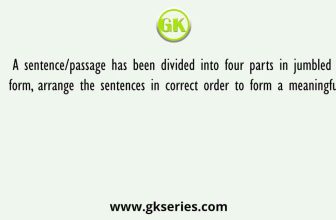
Direction: Read the following passage carefully and answer the questions correctly. The political system always dominates the entire social science; and hence those who wield political power are generally able to control all the Efferent social sub-systems and manipulate them to their own advantage. The social groups in power, therefore, have always manipulated the education systems, especially when these happen to depend upon the State for their very existence, to strengthen and perpetuate their own privileged position. But herein lies a contradiction. For the very realisation of their selfish ends, the social groups in power are compelled to extend the benefits of these educational systems to the underprivileged groups also. The inevitable task is generally performed with three precautions abundantly taken care of:
1. the privileged groups continue to be the principal beneficiaries of the educational system, dominate the higher stages of education or the hard core of prestigious and quality institutions or the most useful of courses, so as to safeguard their dominant position of leadership in all works of life;
2 the system is so operated that underprivileged groups can utilise it only marginally in real terms and the bulk of them become either drop-outs or pushouts and get reconciled to their own interior status in society; and
3. the few from the weaker sections that survive and succeed in spite of all the handicaps are generally co-opted within the system to prevent dissatisfaction.
But education is essentially a liberating force so that, as time passes some underprivileged groups do manage to become aware of the reality, the number of the educated persons soon becomes too large to be fully co-opted, and many able individuals among them strive to organise and liberate the weak and the underprivileged. The resultant awareness of the people, combined with suitable organisation, necessarily leads to adjustment in the social structure and to an increase in vertical mobility so that new grous begin to share power.
Eventually, other social changes also follow and the traditional, inegalitarian, and hierarchical social structure tends to be replaced by another which is more modern, less hierarchical and more egalitarian. The educational system,
therefore, is never politically neutral, and it always performs three functions simultaneously viz, it helps the privileged to dominate, domesticates the undreprivileged to their own status in society, and also tends to liberate the oppressed. Which of these functions shall dominate and to what extent, depends mostly on one crucial factor, viz, the quality and quantity of the political education which the system provides or upon its ‘political content.
The developments in Indian society, polity and education during the past 175 years should be viewed against the background of this broad philosophy. From very ancient times, the Indian society has always been elitist and power, wealth and education were mostly confined to the upper castes of the society. What is important to note is that the system has an infinite capacity to adjust or to absorb and, for that very reason, it is extremely resistant to any radical The social system continued to exist almost unchanged till the British administrators began to lay the foundation of the modern system of education.
1. According to the passage, the Indian society has always been
a) insensitive to the needs of elite groups.
b) less hierarchical.
c) politically neutral.
d) None of these
Sol:
(a) is not true because the passage says that “the Indian society has always been elitist”. That “power, wealth and education were mostly confined to the upper castes” implies that there were upper and lower castes, and that there was discrimination between the two. In other words, a hierarchy existed. So (b) is not true. The passage says that “the educational system… is never politically neutral”, the author then asks us to view “the developments in Indian society” against this “background”. So (c) is not true.
2. In the context of the passage, which of the following statements is true regarding those who control political power?
a) They try to establish a just social order.
b) They try to control all the different social subsystems.
c) They facilitate the upward mobility of the underprivileged classes.
d) They manipulate the economic system for the benefits of the underprivileged.
e) None of these
3. According to the passage, the social groups in power have manipulated the educational system because
a) they wanted to preserve their special status.
b) they wanted to give maximum benefits to the underprivileged.
c) they wanted to introduce social changes through the educational system.
d) they wanted to make it politically neutral.
Sol:
The second sentence of the passage tells us that this is done “to strengthen and perpetuate (in other words, the preserve) their own privileged position (that is, special status)”.
4. Which of the following statements is not true in the context of the passage?
a) Educational system tends to enlighten the minds of the underprivileged.
b) Credit for bringing modern system of education goes to Britishers.
c) The privileged groups try to deprive the ‘have nots’ of the real benefits of education.
d) The privileged class depends upon the Government for their survival.




